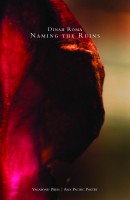Naming the Ruins by Dinah Romah reviewed by Merlinda Bobis
by Dinah Romah
Vagabond
Reviewed and launched by MERLINDA BOBIS
What do you do with loss? Or with the violated body? Or the devastated dream? What do you with ruins?
You name them. You story them. You incant them into ‘oracles of love.’
This is what Naming the Ruins and its poet Dinah Roma have done: ‘Make oracles of love.’ Even if the poet herself says, ‘No more’, in the opening poem Coda—
The first call
after the pain exhausts—
the voice valiant
in distance. No more
the need to pull in,
to muse on what
could have been.
Or make an oracle
out of love.
(9)
So, the poet protests: ‘No more’ to ‘make an oracle out of love.’ Even as each poem in this book is, in fact, an ‘oracle of love.’
Of course, there is a marked distinction here: To make an oracle out of love is to make love a portent or a promise, a harbinger of something else. But to make an oracle of love is about the loving in the making, as when a poem is loved into being, so
The words are uttered,
each syllable freed
for what it is.
(9)
So the loss, the violation and devastation, the ruins fall away, and what remains is
The sound of heartbeat,
crisp on the verge
of song
not of misery,
nor of joy,
(9)
But of desire, as desire is always on the verge of, which is the very locus of this book—this body re-instating desire that was once violated, devastated, lost.
But how paradoxical that this song which the poet verges on is, in fact
… the silence
of great cathedrals
as the last note
falls
in praise.
(9)
It could be the silence of relief, rest, or illumination after loss and lament, or even after reading a poem. It could be all of these silences, but more compellingly, it is also the silence of praise. That hush of awe.
I hear it in this collection—and strangely, or perhaps aptly, in the white space after a solitary word falls.
I, too, hear Rainer Maria Rilke coming into this white space, as if coming into the light in his Sonnets to Orpheus—
Only in the Realm of Praising should Lament
walk, the naiad of the wept-for fountain,
watching over the stream of our complaint
that it be clear upon the very stone
that bears the arch of triumph and the altar.
—(The Sonnets to Orpheus, 237)
So I am led to ask: What right do we have to lament if we cannot praise?
Lament there is in Dinah’s poetry—and always, always praise. And even in the lamentation—whether it is for love betrayed, or for lives wrecked by superstorm Haiyan, or for the loss of a culture in Angkor Wat, or for a mother being laid to rest—lament becomes praise, when it becomes a poem.
In ‘Consuming Sorrow’, the poet raises both query and command—
Why waste the rites
of lament when they can be
put on show? Inside the pantry,
sorted out in cans, labeled
with fancy fonts. Each name,
a use. Or beside a vase of blooms,
magnificent in minutiae,
an exotic figure hand-picked
from a bazaar of all lost
and transported. Or let it
hang from your neck, the sheen
of gems guarding an order
of value, their shores and hills
polished after the silhouette of bone.
Or let a ring grasp the full
diameter of eternity in vows
engraved in indelible death.
(16)
There is a self-mocking stance towards the making precious of grief and its performance—something to be consumed—even as the poet strategically makes sorrow flesh, real, touchable—
Its nature is solid. Its measure
is mass and volume. So let it stand
among your prized possessions.
Let it say: here, touch me,
don’t be afraid. …
(16)
Hear the doubleness of the invitation: ‘Touch me’ and touch the grief (it’s out there, on display), and this body-in-grief (it’s me before you, reader). Make me solid too.
don’t be afraid
A call to courage like a call to arms, in a bid for kinship: from solid to solidarity. So with her reader-witness, the poet is brave. To lament, to wail, to speak of ruins, to make them seen and heard as incantation—as Philippine shamans would. They who know how praise and transcendence are organic to lament; they who live by oracle-making.
So as we “witness” each poem in this book, we too are co-opted into this oracle-making.
… We [become] bodies
circling into radiance unimpeded
into the trail of sudden tremor.
(34)
It is this sudden tremor of consciousness after each poem that astounds in this collection. That returns us to the silence of great cathedrals.
So witness the lived bodies in this book—utter them, incant them.
Yes, Roma is a Philippine poet. She writes about her specific culture, its world and worldview—that she expands beyond this specificity, beyond the white spaces around her spare lines, beyond the page, the book, and into the air that we breathe.
Roma writes from the voices of her own home. And yet these voices can come alive in our own mouths: other breaths suddenly in our breath. Because—
I am the story told many times over.
I am someone in someone else’s
body of someone else.
(12)
Lest we forget: all of us are that ‘body of someone else.’ But only if we are willing and unafraid to acknowledge it.
NOTES
The Sonnets to Orpheus (I, 8),’The Selected Poetry of Rainer Maria Rilke. Trans & Ed Stephen Mitchell. (1989). NY: Vintage, 1989, p237.
MERLINDA BOBIS is an award-winning Filipino-Australian writer. She teaches at the University of Wollongong
